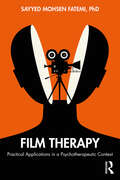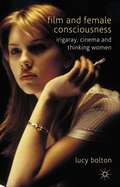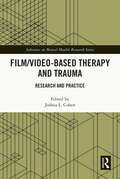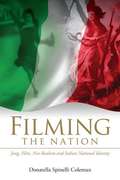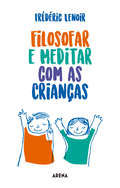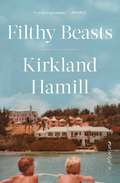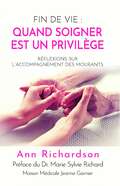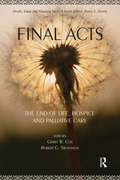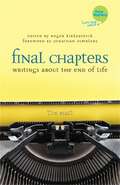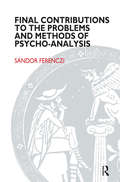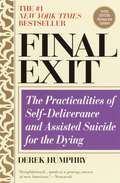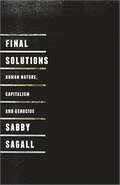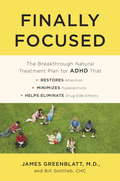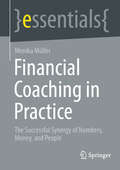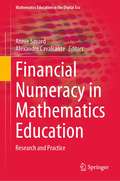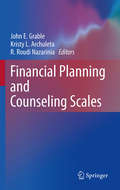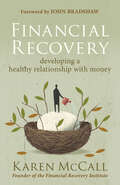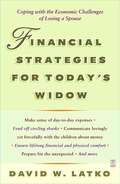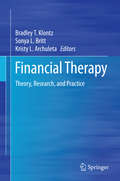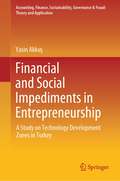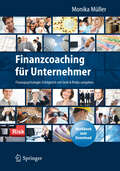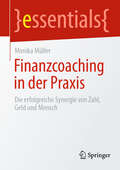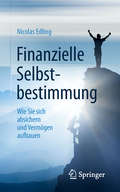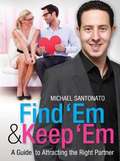- Table View
- List View
Film Therapy: Practical Applications in a Psychotherapeutic Context
by Sayyed Mohsen FatemiUnlike any book on the market, Film Therapy introduces a new paradigm in exploring the subtexts of movies and their potential therapeutic dimensions. The book illuminates how feature films can entail psychological components that can facilitate the therapeutic process. By elaborating the key concepts of each film and their psychological and psychotherapeutic discussions, this book provides a demonstration of the films’ practical applications in a therapeutic setting, opening a new world for understanding and exploring the dynamics of films in human interaction. The book powerfully delineates the rarely discussed role of films in psychological realms and argues how films can be educationally inspiring for therapists, psychologists, and educators.
Film and Female Consciousness
by Lucy BoltonFilm and Female Consciousness analyses three contemporary films that offer complex and original representations of women's thoughtfulness and individuality: In the Cut (2003), Lost in Translation (2003) and Morvern Callar (2002). Lucy Bolton compares these recent works with well-known and influential films that offer more familiar treatments of female subjectivity: Klute (1971), The Seven Year Itch (1955) and Marnie (1964). Considering each of the older, celebrated films alongside the recent, unconventional works illustrates how contemporary filmmaking techniques and critical practices can work together to create provocative depictions of on-screen female consciousness. Drawing on the philosophy of Luce Irigaray in relation to women's cultivation of self-knowledge, this book examines female characters as they go through processes of transition or transformation. Bolton's approach demonstrates how the encounter between Irigaray and cinema can yield a fuller understanding of the fundamental relationship between film and philosophy. Through meticulous theoretical positioning, and close textual analysis, Bolton shows how cinema can create works of philosophy that investigate questions of personal identity, sexuality and relationships with others. Furthermore, the book explores the implications of this approach for filmmakers and spectators, and suggests Irigarayan models of authorship and spectatorship that reinvigorate the notion of women's cinema.
Film/Video-Based Therapy and Trauma: Research and Practice (Advances in Mental Health Research)
by Joshua L. CohenThis book uses film/video-based therapy to help build resilience in facing personal, communal, national, and global trauma triggers. Offering a rich and diverse range of perspectives on trauma, this volume advocates positive social change using therapeutic techniques in filmmaking as well as film/video-based therapy, in conjunction with expressive art therapies such as drama, dance, music, painting, drawing, and more. Chapter authors address issues in one’s home, community, country, and the world using integrative medicine and advocacy using film/video-based therapy and digital storytelling. The book highlights psychological trauma and how one can cope with the overwhelming triggers in today’s world. It represents an articulate and comprehensive analysis of the ways in which traumatic human experience impacts, and is modified by, film and video media. Representing a rich and diverse range of perspectives on trauma through the lens of a camera, the authors document important examples of moments in which artistic expression becomes human resilience. Demonstrating how the language of film can facilitate watching, processing, and discussing images of trauma in therapy, in the home, in the community, and in the world, this volume will be of interest to educators and mental health practitioners with an interest in advancing psychotherapy and counseling techniques.
Filming the Nation: Jung, Film, Neo-Realism and Italian National Identity
by Donatella Spinelli ColemanItalian neo-realism has inspired film audiences and fascinated critics and film scholars for decades. This book offers an original analysis of the movement and its defining films from the perspective of the cultural unconscious. Combining a Jungian reading with traditional theorizations of film and national identity, Filming the Nation reinterprets familiar images of well-known masterpieces by Roberto Rossellini, Vittorio de Sica and Luchino Visconti and introduces some of their less renowned yet equally significant films. Providing an illuminating analysis of film images across a particularly traumatic and complex historical period, Filming the Nation revisits the concept of national identity and its ‘construction’ from a perspective that combines cultural, psychoanalytic and post-Jungian theories. As such this book will be essential reading for all students and scholars of film and psychoanalysis.
Filosofar e Meditar com as Crianças
by Fréderéric LenoirO que dizem as crianças sobre a meditação: <P><P> - Maël (9 anos): É para se descansar e não pensar em nada. <P>- Charlie (9 anos): É para esvaziar a mente. <P>- Robin (11 anos, que já fez a experiência com o seu pai): Quando estamos enervados, esvaziamos a cabeça para pôr as emoções no ponto zero. <P>- Clara (9 anos): É uma coisa que acalma, procuramos a serenidade. <P>- Ouali (7 anos): É quando fazemos uma coisa relaxante. <P>- Maroua (8 anos): Serve para se ficar zen. <P>- Péniel (9 anos): É concentrarmo-nos na mente, não nos deixarmos perturbar. <P>«Este livro conta a extraordinária aventura que vivi com centenas de crianças em todo o mundo francófono, deParis a Montreal, passando por Molenbeek, Abidjan, Pézenas, Genebra, Mouans-Sartoux, Córsega e Guadalupe. Para quê esperar pelo final da aula para abordar temas existenciais: amor, respeito, felicidade, sentido da vida, emoções, etc.? Estes workshops filosóficos mostraram-me a capacidade surpreendente que as crianças de seis a dez anos têm para pensar. Além dos conceitos, aprendem as regras do debate de ideias e desenvolvem o discernimento e reflexão pessoal. Faço uma breve meditação ou prática da atenção plena antes, o que permite que todos estejam presentes no momento. Este livro fornece a metodologia e ferramentas práticas para qualquer um que deseje acompanhar as crianças na prática da atenção plena e do pensamento filosófico.»
Filthy Beasts: A Memoir
by Kirkland HamillRunning with Scissors meets Grey Gardens in this &“vivid tragicomedy&” (People), a riveting riches-to-rags tale of a wealthy family who lost it all and the unforgettable journey of a man coming to terms with his family&’s deep flaws and his own hidden secrets. &“Wake up, you filthy beasts!&” Wendy Hamill would shout to her children in the mornings before school. Startled from their dreams, Kirk and his two brothers couldn&’t help but wonder—would they find enough food in the house for breakfast? Following a hostile exit from New York&’s upper-class society, newly divorced Wendy and her three sons are exiled from the East Coast elite circle. Wendy&’s middle son, Kirk, is eight when she moves the family to her native Bermuda, leaving the three young boys to fend for themselves as she chases after the highs of her old life: alcohol, a wealthy new suitor, and other indulgences. After eventually leaving his mother&’s dysfunctional orbit for college in New Orleans, Kirk begins to realize how different his family and upbringing is from that of his friends and peers. Split between rich privilege—early years living in luxury on his family&’s private compound—and bare survival—rationing food and water during the height of his mother&’s alcoholism—Kirk is used to keeping up appearances and burying his inconvenient truths from the world, until he&’s eighteen and falls in love for the first time. A keenly observed, fascinating window into the life of extreme privilege and a powerful story of self-acceptance, Filthy Beasts is &“a stunning, deeply satisfying story about how we outlive our upbringings&” (Kirkus Reviews, starred review).
Fin de vie: Réflexions sur l’accompagnement des mourants
by Ann RichardsonUne mise en lumière des soins de fin de vie. La mort est un sujet gênant. Personne n'aime penser à ce que seront ses derniers jours. Mais s'il nous arrive d'y réfléchir, nous souhaitons qu'ils soient paisibles et tranquilles et nous voulons avoir la chance de pouvoir dire au revoir à nos proches. « Fin de vie : quand soigner est un privilège » vous entraîne dans les coulisses des soins palliatifs où vous vous rendrez compte des efforts énormes que font les infirmières, les médecins, les aumôniers et d'autres, y compris un chef cuisinier plein de bon sens, pour créer ce calme auquel nous aspirons tous. Peut-être vous intéressez-vous aux soins palliatifs pour un proche ? Peut-être vous demandez-vous si vous êtes fait pour travailler dans ce domaine ? Ou bien peut-être avez-vous simplement besoin d'être inspiré par le meilleur de l'humanité ? Ce livre est fait pour vous. VIVEMENT SALUÉ par la British Medical Association en 2008. « Des réflexions simples sur des sujets complexes dans le domaine des soins qui résonnent longtemps après en avoir terminé la lecture. » Newsletter du Cancer Nursing Forum, Royal College of Nursing « Un livre facile à lire qui surprendra de nombreux lecteurs par sa légèreté, son humanité et son ton rafraîchissant. Je le conseillerais à toute personne qui s’inquiète de sa propre fin de vie ou de celle d’un proche. » Dr Nansi-Wynne Evans, généraliste, BMA Medical Book Competition
Final Acts: The End of Life: Hospice and Palliative Care (Death, Value and Meaning Series)
by Gerry R. Cox Robert G. StevensonThe editors undertook this project to promote the International Conference on Death, Grief, and Bereavement in La Crosse, Wisconsin, USA. Throughout its history, the conference has attracted internationally known speakers. This book illustrates the quality of their presentations. Section One, "Professional Applications in End of Life Care," begins with Currier, Hammer, and Neimeyer's examination of the importance of the social network, including both religion and family, not just the individual, in working with those at the end of their lives. The authors analyse the impact of social support and its health implications. In Chapter 2, Parkes looks at the influence of child development on adult life and bereavement. Rather than simply showing how insecure child development affects loss as adults, he examines how insecure attachments in childhood can lead to extreme attachments to God, homes, territories, political leaders, and symbols and discusses interventions for these extreme attachments. Papadatou (Chapter 3) develops a model for professionals and caregivers who work with the dying. She suggests that those who give care to the dying also have multiple needs and also face suffering, examines the private world of professionals and what is healthy and what is unavoidable, and describes both functional and dysfunctional coping patterns used by professionals. Kobler (Chapter 4) uses case studies to explain how to develop and maintain relationships with children and their families in paediatric palliative care. She offers strategies for using rituals and ways to initiate and maintain relationships with children and their families. Thompson (Chapter 5) focuses on the effects of working in situations involving high levels of emotion and the stress that may result. He makes a strong case that such stress can do harm to individuals, groups, and whole organisations and offers a model for a more holistic approach that incorporates social and organisational strategies and practical ways to prevent and manage stress. Eves-Baine and colleagues (Chapter 6) examine the application of paediatric and adult-based principles to the newborn period. They discuss how to create the best situations for families when life-sustaining medical therapy has been withdrawn, how to support the family, and the ethical challenges that perinatal palliative care presents. The authors offer models for care through the journey of palliative and bereavement care. Section Two, "Facing End of Life and Its Care," begins with Gilbert's chapter presenting a strong argument that caregivers need to honour the multiple tracks that come with dying while maintaining a focus on the wishes of the dying person. He offers ways for the team to better meet the needs of the dying person. Koppleman (Chapter 8) follows the journey of a friend who faced death. It is a powerful story, told from the point of view of the dying in a scholarly fashion. Smith and Potter (Chapter 9) suggest that palliative care for the dying can be defined as offering "comfort care," both for those who are dying and for their loved ones. The authors present a model of the psycho-spiritual side of palliative care as a way of offering comfort to all those involved. Adams (Chapter 10) examines different methods of working with patients and families. It looks at the ways in which such work can be complicated by factors of geographic distance, differences in family reactions, differences in treatment plan concepts, and in meaning making. All of these factors may become stumbling blocks and may prevent the delivery of positive support. Pizzini (Chapter 11) looks at the experience of dying in prison from the perspective of inmates who are terminally ill, prison medical staff, and prison security staff. She discusses how to maintain dignity of the dying and a "good death" while in prison. McCord (Chapter 12) discusses attempts by hospice patients and others diagnosed with terminal illnesses to die either by their own hand or with physician assistance. She presents commo
Final Chapters: Writings About the End of Life
by Roger Kirkpatrick"The milkman cried when I told him you were dead. 'Last night,' I said, 'Mark died.'" This collection brings together 30 short stories and poems about dying and bereavement. Written by mothers, fathers, daughters, sons, wives, husbands and dying people, these moving pieces talk honestly about how it feels to care for someone who is dying, to grieve for a loved one, and to face death oneself. A candid story about a daughter's relationship with her mother's carer; an internal monologue on dementia; a deeply moving poem about losing a son to cot death; and a heartfelt story about a mother's end of life are some of the poignant pieces included. This collection provides an opportunity to think and talk about death and dying, too often a taboo subject, and offers readers the rare comfort and support of shared experience.
Final Contributions to the Problems and Methods of Psycho-analysis (Brunner-mazel Classics In Psychoanalysis And Psychotherapy Ser. #No. 8)
by Sandor FerencziThis final volume includes "Confusion of Tongues Between Children and Adults" in which Ferenczi formulates his controversal ideas on childhood sexuality, and the conflict between the languages of tenderness and passion. First published in 1955, this book contains papers written by Ferenczi during his last years and some of his unpublished notes. It demonstrates Ferenczi's combination of great clinical understanding and an almost uncanny insight into unconscious process. Among the forty important items included are papers on the following: "Freud's Influence on Medicine", "Laughter", "Epileptic Fits", "Dirigible Dreams", "Philosophy and Psycho-Analysis", "Paranoia", "The Interpretation of Tunes Which Come into One's Head" and "The Genesis of Jus Primae Noctis".
Final Exit: The Practicalities of Self-deliverance and Assisted Suicide for the Dying (3rd edition)
by Derek HumphryThe first edition offered people with terminal illness a choice on how and when to end their suffering. This revised and updated third edition goes far beyond the original to provide new information about the legality of the personal issues involved.
Final Solutions: Human Nature, Capitalism And Genocide
by Sabby SagallFinal Solutions offers a ground-breaking and genuinely unique analysis of modern genocide. Sabby Sagall draws on the insights of the Frankfurt school and Wilhelm Reich to create an innovative combination of Marxism and psychoanalysis. He argues that genocide is a product of an ‘irrational’ destructiveness by social classes or communities that have suffered major historical defeats or similar forms of extreme stress. <P><P> Sagall shows how the denial of human needs and the ensuing feelings of isolation and powerlessness propel groups to project their impotent rage, hatred and destructiveness engendered by these defeats on to the 'outsider' and the 'other'. <P><P> The book applies this theoretical framework to four modern genocides – that of the Native Americans, the Armenians, the Jews and the Rwandan Tutsis. This is a truly pioneering contribution which adds to our understanding of some of the darkest hours of humanity – and how we can stop them from happening again.
Finally Focused: The Breakthrough Natural Treatment Plan for ADHD That Restores Attention, Minimizes Hyperactivity, and Helps Eliminate Drug Side Effects
by Bill Gottlieb James GreenblattDISCOVER THE ADHD SOLUTION FOR YOUR CHILDDr. James Greenblatt has seen thousands of children and adults struggling with the symptoms of ADHD – hyperactivity, inattentiveness, impulsiveness, and often irritability and combativeness. Rather than simply prescribing medication for their ADHD symptoms, he tailors remedies to his patients’ individual needs, detecting and treating the underlying causes of the disorder. Finally Focused provides proven natural and medical methods to easily treat problems such as nutritional deficiencies or excesses, dysbiosis (a microbial imbalance inside the body), sleeping difficulties, and food allergies, all of which surprisingly can cause or worsen the symptoms of ADHD. Using Dr. Greenblatt’s effective Plus-Minus Healing Plan, parents will first understand the reasons behind their child's symptoms, and then be able to eliminate them by addressing the child’s unique pattern of biological weakness. Adults with ADHD can do the same for themselves. And if conventional medication is still necessary, this integrative approach will minimize or even eliminate troublesome side effects. Using Dr. Greenblatt’s expert advice, millions of children and adults with ADHD finally will get the help they need to achieve true wellness.
Financial Coaching in Practice: The Successful Synergy of Numbers, Money, and People (essentials)
by Monika MüllerThis essential provides a comprehensive introduction to the definition and significance of financial coaching. You will get an overview of international research in this field and learn about the crucial role psychology plays in financial decisions. The author presents the latest research findings that clarify whether intellect, intuition, or emotion are decisive for good decisions. Financial coaching begins with diagnostics, which includes measuring risk tolerance as well as biographical work on the individual psychodynamic effects of money projections. The reader learns how coaching helps to shed unfavorable decision patterns and successfully implement new ones. Practical insights into the profession of financial coaching and the underlying core competencies round off the book. You will expand your understanding of financial coaching and can use the insights from this book for your own success.
Financial Counseling
by Dorothy B. Durband Ryan H. Law Angela K. Mazzolini"This text is a valuable new resource that we recommend for all of our professionals and are proud to incorporate as part of our AFC® certification program. With expertise representing the breadth and depth of the financial counseling profession, the content in this text provides you with a rigorous foundation of knowledge, considers critical theoretical models, and explores foundational skills of communication, self-awareness, and bias. This type of comprehensive approach aligns with our mission and vision—providing you with the foundational knowledge to meet clients where they are across the financial life-cycle and impact long-term financial capability." -Rebecca Wiggins, Executive Director, AFCPE® (Association for Financial Counseling and Planning Education®)This timely volume presents a comprehensive overview of financial counseling skills in accessible, practical detail for readers throughout the career span. Expert financial counselors, educators, and researchers refer to classic and current theories for up-to-date instruction on building long-term client competence, working with clients of diverse backgrounds, addressing problem financial behavior, and approaching sensitive topics. From these core components, readers have a choice of integrated frameworks for guiding clients in critical areas of financial decision-making. This essential work: · Offers an introduction to financial counseling as a practice and profession · Discusses the challenges of working in financial counseling · Explores the elements of the client/counselor relationship · Compares delivery systems and practice models · Features effective tools and resources used in financial counseling · Encourages counselor ethics, preparedness, and self-awareness A standout in professional development references, Financial Counseling equips students and new professionals to better understand this demanding field, and offers seasoned veterans a robust refresher course in current best practices.
Financial Numeracy in Mathematics Education: Research and Practice (Mathematics Education in the Digital Era #15)
by Annie Savard Alexandre CavalcanteThis book presents the important role of mathematics in the teaching of financial education. Through a conceptualization of financial numeracy as a social practice, it focuses on the teaching practices, resources, and needs of secondary mathematics teachers (grades 7-12) to incorporate financial concepts in their classes. The editors and authors bring forth a novel perspective regarding mathematics education in the digital era. By focusing on financial numeracy, a key component of skills required in the digital era, they discuss important issues related to the teaching and learning of mathematics and finance. In contrary to most research in the field of financial education coming from scholars in areas such as business, accounting, management and economics, this book introduces the contribution of researchers from the field of education to the debate. The book appeals to an international audience composed of researchers, stakeholders, policymakers, teachers, and teacher educators.
Financial Planning and Counseling Scales
by R. Roudi Nazarinia Roy John E. Grable Kristy L. ArchuletaThe personal, household, and consumer finance field is growing quite rapidly, especially as universities and policy makers see the need for additional research and clinical application in this dynamic area of study. Currently, the profession is advancing towards the stage where professional practice becomes increasingly evidenced-based. Financial Planning and Counseling Scales provides educators, researchers, students, and practitioners with a much needed review of reliable and valid personal assessment scales and instruments that can be used for both research and clinical practice. In addition to presenting actual scales and instruments with applicable psychometric details, the book also includes an overview of measurement issues and psychometric evaluation.
Financial Recovery: Developing a Healthy Relationship with Money
by Karen McCallAfter healing her own unhealthy relationship with money, and transforming her financial disaster into prosperity and security, Karen McCall created a recovery program she has now used for more than twenty years to help individuals, couples, and businesses large and small. In the midst of her money troubles, she saw a need for something other than financial planners, accountants, and credit counselors. These experts could tell her what she should be doing differently, but she needed someone to help her understand the underlying causes of chronic, self-defeating overspending and credit card debt, underearning, and low or no savings. To save herself, she created practical, holistic tools that address these sources of pain and shame. McCall’s program supports people as they uncover their deep-seated attitudes about money; provides simple, step-by-step tools for healing areas of physical, emotional, and spiritual deprivation; and teaches skills and strategies for experiencing lasting personal and financial fulfillment even in the midst of economic challenges and reversals.
Financial Strategies for Today's Widow
by David W. LatkoA successful financial counselor with twenty-five years' experience empowers widows to manage their finances and attain lifelong securityIn many cases, losing a husband also means losing a financial partner. Suddenly, a widow is faced with essential decisions that she must consider single-handedly. With Financial Strategies for Today's Widow, David W. Latko, whose financial seminars have been attended by more than ten thousand people, answers every question a widow may have -- whether she is old, young, or in between -- and guides her out of any money problem. His advice is matter-of-fact, yet reassuring and uniquely tailored to every step of a widow's financial life including how to: Understand the choices that come with reorganizing one's finances Make sure there will always be enough Know what your assets are and how to access them Choose the right insurance Choose a financial advisorUser-friendly and replete with real-life stories of those who have benefited from the advice Latko offers here, Financial Strategies for Today's Widow takes readers through potential pitfalls and problems and lays out specific strategies for handling common economic hurdles.
Financial Therapy
by Kristy L. Archuleta Sonya L. Britt Bradley T. KlontzMoney-related stress dates as far back as concepts of money itself. Formerly it may have waxed and waned in tune with the economy, but today more individuals are experiencing financial mental anguish and self-destructive behavior regardless of bull or bear markets, recessions or boom periods. From a fringe area of psychology, financial therapy has emerged to meet increasingly salient concerns. Financial Therapy is the first full-length guide to the field, bridging theory, practical methods, and a growing cross-disciplinary evidence base to create a framework for improving this crucial aspect of clients' lives. Its contributors identify money-based disorders such as compulsive buying, financial hoarding, and workaholism, and analyze typical early experiences and the resulting mental constructs ("money scripts") that drive toxic relationships with money. Clearly relating financial stability to larger therapeutic goals, therapists from varied perspectives offer practical tools for assessment and intervention, advise on cultural and ethical considerations, and provide instructive case studies. A diverse palette of research-based and practice-based models meets monetary mental health issues with well-known treatment approaches, among them: Cognitive-behavioral and solution-focused therapies. Collaborative relationship models. Experiential approaches. Psychodynamic financial therapy. Feminist and humanistic approaches. Stages of change and motivational interviewing in financial therapy. A text that serves to introduce and define the field as well as plan for its future, Financial Therapy is an important investment for professionals in psychotherapy and counseling, family therapy, financial planning, and social policy.
Financial and Social Impediments in Entrepreneurship: A Study on Technology Development Zones in Turkey (Accounting, Finance, Sustainability, Governance & Fraud: Theory and Application)
by Yasin AkkuşThis book uncovers the barriers that impede entrepreneurial innovation, delving into the profound impact of personality traits on success. It explores the psychological and sociological factors that hinder progress, providing valuable insights into the hidden challenges faced by entrepreneurs. As Small and Medium-Sized Enterprises (SMEs) thrive in global markets, sustainable development faces obstacles. This book reveals the overlooked psychological and sociological hurdles that entrepreneurs encounter, shedding light on their effects on innovation.Through extensive research, the authors illuminate the connection between personality traits and entrepreneurial success, particularly risk-taking propensity. They uncover the complex interplay between personal traits and the social environment, highlighting societal constructs that impede entrepreneurial potential.While research on entrepreneurial personalities has grown, understanding sociological impediments remains limited. This book bridges the gap, offering a comprehensive analysis of the multifaceted challenges entrepreneurs face. It equips readers with strategies to navigate complexities and foster innovation.This transformative book unveils the barriers hindering entrepreneurial innovation, unlocking the psychological and sociological obstacles. It is a must-read for aspiring entrepreneurs, professionals, researchers, and policymakers seeking to harness SME potential for a prosperous future.
Finanzcoaching für Unternehmer
by Monika MüllerMenschen unterscheiden sich durch ihr Verhältnis zu Geld und Risiko, deshalb spielt die Psychologie bei Finanzentscheidungen eine zentrale Rolle. Die Autorin begleitet seit Jahren Mitarbeiter von Unternehmen, die Finanzentscheidungen unter Risiko treffen. In dem Band vermittelt sie grundlegendes Wissen über die psychologischen Mechanismen beim Umgang mit Geld und Risiko und deren Bedeutung für den unternehmerischen Erfolg. Interviews mit Unternehmern und Praxisbeispiele zeigen, wie sich dieses Wissen im Alltag auswirkt. Mit Workbook zum Download.
Finanzcoaching in der Praxis: Die erfolgreiche Synergie von Zahl, Geld und Mensch (essentials)
by Monika MüllerDieses essential bietet eine umfassende Einführung in die Definition und den Stellenwert von Finanzcoaching. Sie erhalten einen Überblick über die internationale Forschung auf diesem Gebiet und erfahren, welche entscheidende Rolle die Psychologie bei Finanzentscheidungen spielt. Die Autorin stellt die neuesten Forschungsergebnisse vor, die klären, ob Verstand, Intuition oder Gefühl für gute Entscheidungen ausschlaggebend sind. Finanzcoaching beginnt mit der Diagnostik, die die Messung der Risikobereitschaft ebenso einbezieht wie die biografische Arbeit an den individuellen psychodynamischen Auswirkungen von Geldprojektionen. Der Leser erfährt, wie Coaching hilft, ungünstige Entscheidungsmuster abzulegen und neue erfolgreich umzusetzen. Praktische Einblicke in den Beruf des Finanzcoaches und die zugrunde liegenden Kernkompetenzen runden das Buch ab. Sie erweitern Ihr Verständnis von Finanzcoaching und können die Erkenntnisse aus diesem Buch für Ihren eigenen Erfolg nutzen.
Finanzielle Selbstbestimmung: Wie Sie sich absichern und Vermögen aufbauen
by Nicolas EdlingDieses Sachbuch vermittelt Ihnen das notwendige Wissen zum Aufbau von finanziellem Schutz und Vermögen. Mit einem schlichten, aber wirksamen Konzept zeigt Dr. Nicolas Edling einen Weg, mit dem auch Sie mittel- bis langfristig finanzielle Selbstbestimmung erreichen und frei von Geldsorgen leben können.Das komplett individualisierbare Baukastensystem setzt zunächst bei Ihrer persönlichen Einstellung zum Thema Geld an. Sie lernen, Ihre eigene finanzielle Vision und positive Geldgewohnheiten zu entwickeln. Danach erfahren Sie, wie Sie sich und Ihre Familie finanziell absichern. Abschließend lernen Sie eine genial einfache Investitionsstrategie kennen und erfahren, wie Sie wissenschaftliche Erkenntnisse nutzen, um kontinuierlich Vermögen aufzubauen und finanziell erfolgreich zu werden. Das Beste ist: Sie können dies ohne wirtschaftliche Vorkenntnisse und auch mit einem niedrigen Einkommen erreichen. Alle Ansätze und Ratschläge sind relevant, bewährt, einfach anzuwenden und liefern überprüfbare sowie wiederholbare Ergebnisse – „lebensschlaues“ Finanzwissen für jedermann.
Find 'Em & Keep 'Em: A Guide to Attracting the Right Partner
by Michael SantonatoFind Em & Keep Em is not about dating. You've got enough books and blogs for that. Instead, it is about getting to know yourself, what you want, and what you have to offer within a relationship. By mastering who you are, and what is at play in the dynamics of attraction and magnetism, you will be able to understand why you haven't had those great partners and relationships in the past. And how you can start to have them now! "There is no reason why someone can't be in a fulfilling relationship with someone they love." It's about becoming the kind of person who can be with anyone you want to be with and naturally attracting him or her in record speed. This book is essential if you want to get off the fence and get into a great relationship!
